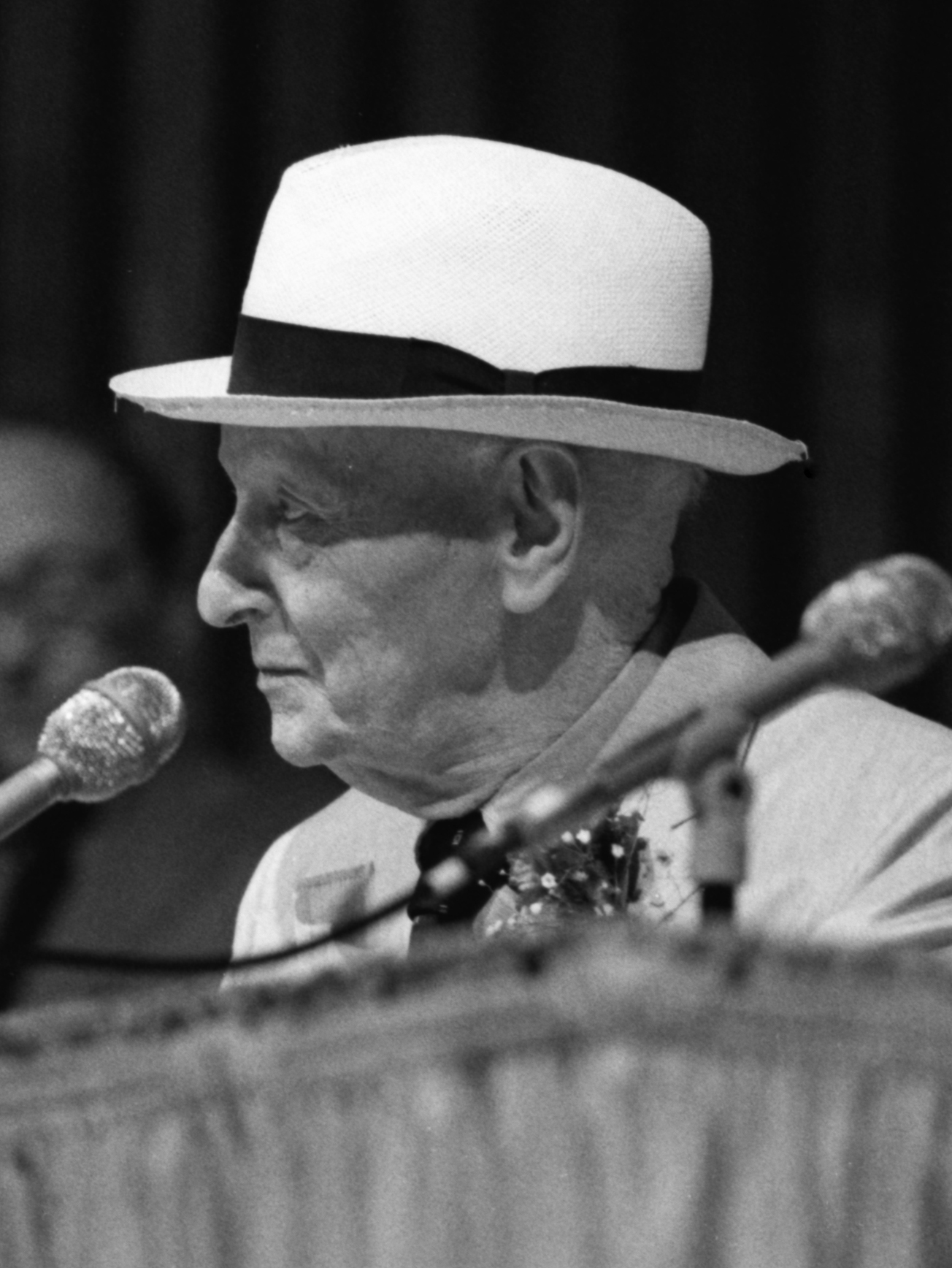Isaac Bashevis Singer Frases y Citas
Isaac Bashevis Singer: Frases en inglés
Fuente: The Collected Stories of Isaac Bashevis Singer
Preface to Food for the Spirit: Vegetarianism and the World Religions by Steven Rosen (New York: Bala Books, 1987, )
Variante: To be a vegetarian is to disagree - to disagree with the course of things today... starvation, cruelty - we must make a statement against these things. Vegetarianism is my statement. And I think it's a strong one.
Contexto: Vegetarianism is my religion. I became a consistent vegetarian some twenty-three years ago. Before that, I would try over and over again. But it was sporadic. Finally, in the mid-1960s, I made up my mind. And I've been a vegetarian ever since. When a human kills an animal for food, he is neglecting his own hunger for justice. Man prays for mercy, but is unwilling to extend it to others. Why should man then expect mercy from God? It's unfair to expect something that you are not willing to give. … This is my protest against the conduct of the world. To be a vegetarian is to disagree — to disagree with the course of things today. Nuclear power, starvation, cruelty — we must make a statement against these things. Vegetarianism is my statement. And I think it's a strong one.
“We must believe in free will — we have no choice.”
An ironic statement which Singer made in many interviews over many years; here quoted in "Isaac Singer’s Promised City" http://www.city-journal.org/html/7_3_urbanities-isaac.html City Journal (Summer 1997)
Variants or variant translations:
We must believe in free will — we have no other choice.
You must believe in free will; there is no choice.
We have to believe in free will. We’ve got no choice.
This makes more sense if you consider the statement "we must believe in free will; we have no [other logical] choice"
Nobel lecture as quoted in The Observer (17 December 1978) Variant: "They still believe in God, the family, angels, witches, goblins, logic, clarity, punctuation, and other obsolete stuff."
“Our knowledge is a little island in a great ocean of nonknowledge.”
The New York Times (3 December 1978)
Nobel lecture (1978)
Contexto: Not only has our generation lost faith in Providence but also in man himself, in his institutions and often in those who are nearest to him. In their despair a number of those who no longer have confidence in the leadership of our society look up to the writer, the master of words. They hope against hope that the man of talent and sensitivity can perhaps rescue civilization. Maybe there is a spark of the prophet in the artist after all.
Nobel lecture (1978)
Contexto: The storyteller and poet of our time, as in any other time, must be an entertainer of the spirit in the full sense of the word, not just a preacher of social or political ideals. There is no paradise for bored readers and no excuse for tedious literature that does not intrigue the reader, uplift him, give him the joy and the escape that true art always grants. Nevertheless, it is also true that the serious writer of our time must be deeply concerned about the problems of his generation. He cannot but see that the power of religion, especially belief in revelation, is weaker today than it was in any other epoch in human history. More and more children grow up without faith in God, without belief in reward and punishment, in the immortality of the soul and even in the validity of ethics. The genuine writer cannot ignore the fact that the family is losing its spiritual foundation.
“I am a vegetarian for health reasons—the health of the chicken.”
Singer was very devoted to the vegetarian cause and was frequently quoted as saying this statement, as reported in Judaism and Vegetarianism by Richard H. Schwartz (New York: Lantern Books, 2001, ISBN 1-930051-24-7), p. 177 https://books.google.it/books?id=zo5TqKQVcEgC&pg=PA177
Fuente: The Collected Stories of Isaac Bashevis Singer
On winning the Nobel Prize, TIME magazine (16 October 1978)
Nobel lecture (1978)
“Doubt is part of all religion. All the religious thinkers were doubters.”
The New York Times (3 December 1978)
The New York Times (26 November 1978)
" Isaac Bashevis Singer's Universe http://www.nytimes.com/1978/12/03/archives/isaac-bashevis-singers-universe-errors-and-betrayals.html" by Richard Burgin in The New York Times (3 December 1978)
Nobel lecture (1978)
Nobel lecture (1978)
Nobel lecture (1978)
“Take three quarts of duck's milk…”
First words of a "recipe for high-priced cookies" in Stories for Children (1984)
